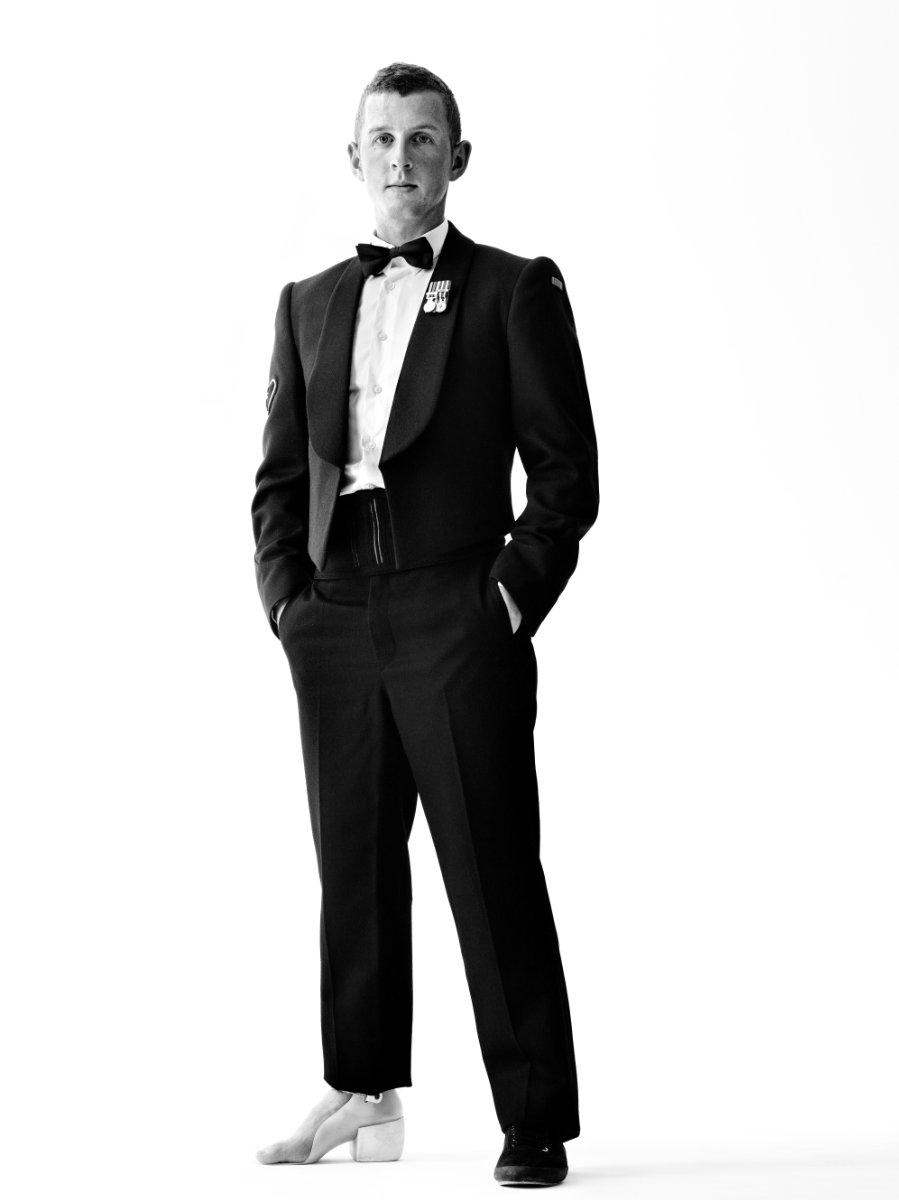
Rifleman
Carl Anstey
I served with 1st Battalion, The Rifles, in Musa Qala, Afghanistan. I was 24 at the time, and my role was a sniper. I also trained the Afghan army in day-to-day fighting and patrolling skills. I think the most difficult thing about being a sniper is having to guard all the people, and choosing your target correctly. When you’re on the ground in Afghanistan, it’s about trying to decipher who is the civilian and who is the enemy. You need to be wise and take your time; you don’t want to injure the wrong person.
I have a very clear memory of the whole day I was injured, 30th January 2009. It began with a 4am start, and we patrolled in north Musa Qala. We were heading towards a village, trying to find enemy hot spots and enemy positions. Then at about 2pm, a firefight broke out on a rooftop. It went on for about an hour and then, during this fire fight, an Afghan army soldier was firing out an RPG [rocket-propelled grenade] towards the enemy. But one of the RPGs misfired. It blew up everyone on the rooftop, killing two guys—the guy who fired the RPG and a friend of mine—straight away. Me and a friend of mine, Dave, were injured.
I didn’t realise what my injuries were at first—there was still a firefight going on. The battlefield was very busy, and we were still trying to suppress enemy fire. I tried to treat myself as much as possible. I was in quite a lot of pain, so I administered morphine to myself. At the time it was quite surreal. I was still conscious, but on morphine so feeling a bit crazy. The guys round me were very supportive, they did a great job of taking care of me and patching me up. Then I was casevac’d by helicopter to Camp Bastion hospital, where I spent four days having various surgeries and operations to try and keep me alive, and also to save the leg. I had injuries to the right side of my leg. I shattered my right femur, suffered penetrating wounds to the right foot, the right calf, the right thigh and the right buttock. The sciatic nerve in my right leg was lacerated and so I lost all feeling and function straight away to my lower leg, from below the knee. Because of this nerve injury, I’d actually thought that my leg had been blown off straight away because I couldn’t feel it at all. So I was quite relived to learn it was still there!
From Bastion, I was then transferred to Selly Oak Hospital for ten weeks. I had a series of operations, to first of all try and fix my right femur. I also had a nerve graft, to repair the laceration to the sciatic nerve in the right thigh, and then I was discharged. I went to Headley Court for two days and then I got an infection and I was readmitted to Selly Oak for a further twelve weeks. Recovery is definitely an ongoing process. It’s now been four and a half years since I was injured, and I’m finally getting there. I’ve had about twenty operations on my leg. It’s OK now; the foot’s still without feeling, so I can’t feel the lower leg on my right side, but apart from that, it’s getting there.
The support of others has been amazing. My family have been great, all the Armed Forces have been fantastic and Headley Court has been amazing too: you get world-class treatment there. Without that support network, it would be a lot harder to recover. The most challenging aspect of my injuries now is learning to deal with the day-to-day pain, and managing it. It’s also trying to blend in without looking too, in a way, too crippled or too disabled. How people regard you can vary. Most people either ask a lot of questions, or just keep quiet.
I think the public now are quite aware of the injuries people sustain, but they don’t take into account the long-term effects of the injury, which will last the rest of your life. They’ll see someone’s injury and then forget about it straight away. But I do think that mental injuries and brain trauma are worse than my injury. I see guys who have PTSD and can’t really break free from that cycle of trauma. There’s also guys who have a brain injury, who don’t know who their family are, who might forget who they are themselves. That’s very difficult, I think. So, in comparison to that, I do see myself as being very lucky.
I’m aware of my injuries and what my limitations are, but it’s a case of adapting. I’m off to university in September to become a physiotherapist. I can definitely do a physio job. I’m going to retrain for three years, then work in the NHS or go private, and maybe I can self-treat in the future for free, and save the pennies! I think I’ve done more now with my injury than before my injury. A lot more doors have opened for me. I did the Atlantic row two years ago with some of the other guys. I’ve had a lot of adventures really, so I’m very lucky that way. I also went surfing last week, for the first time in a few years. It was excellent. Basically it’s just adapting to what you can do and what you can’t. I think I’ve definitely matured because of what happened. I’ve grown up very fast; I think you have to when you get injured. You realise what’s important and what’s not important. You value all family and friends, and you value life. In general, you just enjoy life as much as possible.